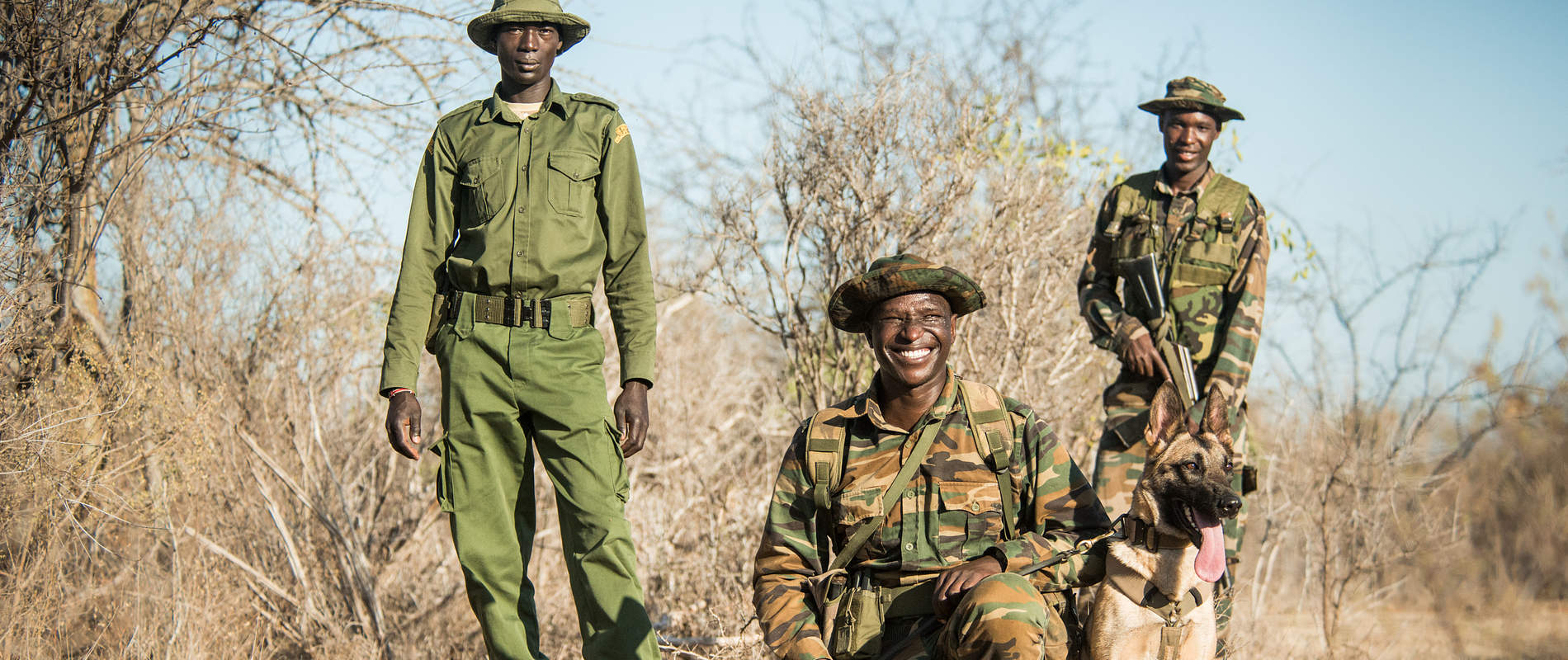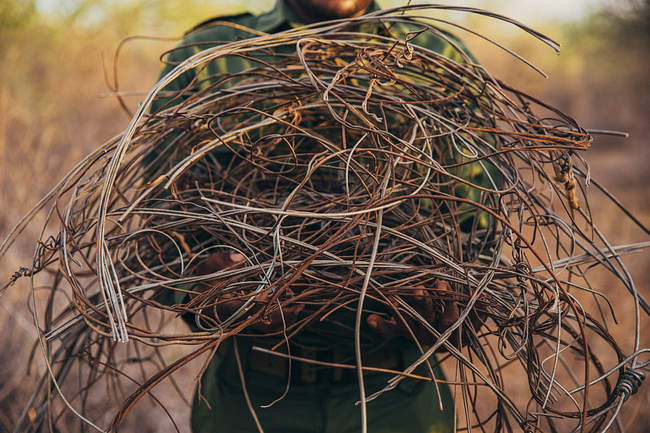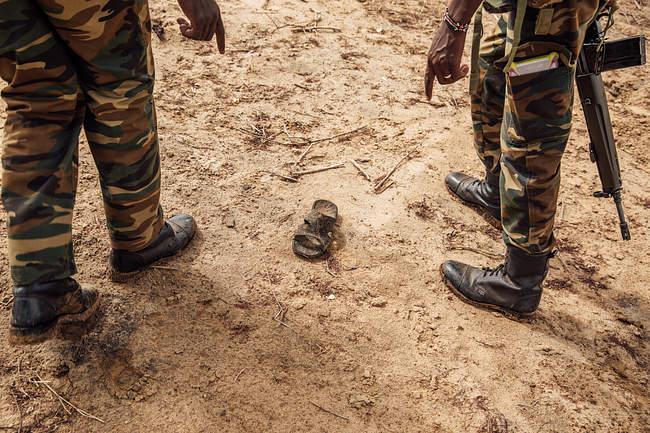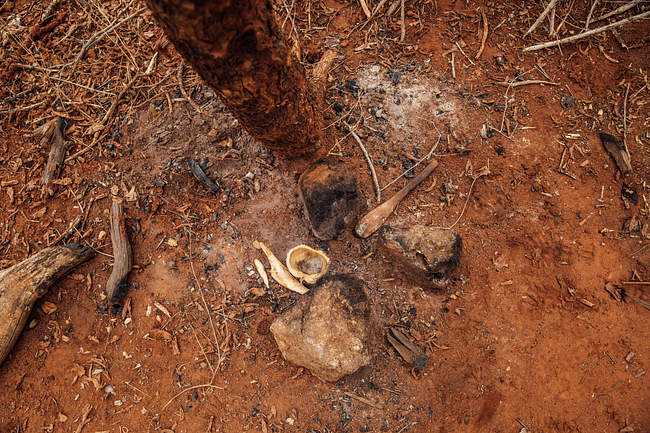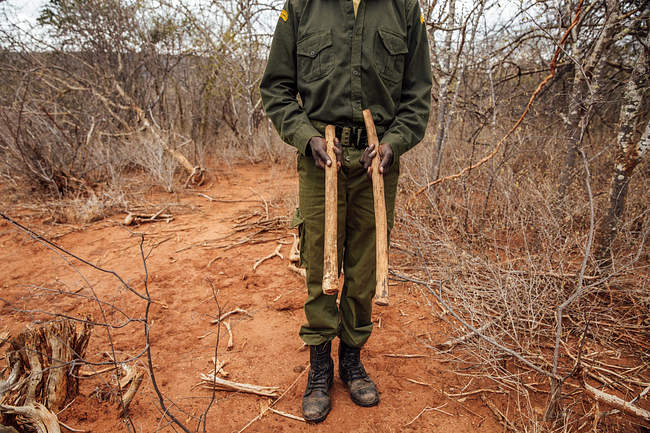Across Kenya, our field teams are patrolling with the KWS to protect wild lives and critical habitats - they are the Guardians of the Wild.
The illegal wildlife trade is the fourth largest illegal trade in the world. An issue of global importance, the ‘supply chains’ for the fauna and fauna traded are close to home; in the bush, plains and forests. Every year, millions of wild lives are cut short by poachers who kill animals for ivory, rhino horn, bushmeat and pangolin scales, to highlight just a few, or seize animals from the wild to live as pets.
In Africa, the poaching of elephants for their ivory saw elephant numbers decrease by 30% between 2007 – 2014 to just 415,000 individuals, today there are believed to be less than 400,000 African elephants in the world. Tackling poaching is a massive undertaking which is why our field teams - made up of members that are both two footed and four - are watching out for threats including elephant and rhino poaching, snaring and bushmeat poaching, illegal logging and livestock intrusion.

Working in partnership with the Kenya Wildlife Service (KWS), our first team began operations in the Tsavo Conservation Area in 2000. Since then, we’ve expanded our anti-poaching operations to include 14 teams working in specific locations across Kenya, including two mobile teams that are deployed wherever they are most needed to bolster group operations, deter poachers, monitor ecosystems and act against those that would do harm to wildlife.
Hot on the trail of any would-be poachers, our teams are supported by our Aerial Unit (made up of seven aircraft) and our SWT/KWS Canine Unit, deployed in response to intelligence or security incidents. Specially trained to track and detect in challenging environments, in favourable conditions, dogs can track disturbances in the ground and spoor, as well as the scent of humans, for up to two days after an incident!
A typical day for our rangers begins at dawn when, after a hearty breakfast, it’s time to lace up their boots and work together in a coordinated foot patrol in a specially designated area. Having built strong ties to local communities, our teams might patrol an area in response to specific local intelligence, if the area is a known-hotspot, or if our SWT pilots have raised the alarm after identifying signs of illegal activity in a protected area – the use of GPS enabling our ground teams to return to an exact location sighted from the air.
When patrolling our vigilant rangers are on the lookout for any signs of illegal activity, traversing a landscape that can include rugged plateaus, dense forest, sandy river beds and thorny bushes, often in temperatures reaching 100 degrees. In these varied and sometimes inhospitable environments, a pair of sturdy boots is a vital piece of equipment that ensures, come rain or shine, our rangers’ feet are protected from the elements.

From identifying and tracking footprints or bicycle tracks to combing an area for freshly laid wire snare traps and confiscating them, our rangers are the first line of defence for endangered, critically endangered and threatened wild animals. Snares in particular can have a devastating impact on the environment. Typically made of wire or rope, they are usually laid to catch animals for bushmeat such as antelope, zebra and giraffe. Laid along known animal pathways or attached to trees, snares can indiscriminately catch any animal that wanders in their path from elephant calves to giraffes.
Once trapped the snare tightens as the animal struggles to free itself causing immense pain and trauma, maiming and slowly killing the victim. Unsurprisingly, one piece of equipment our rangers like to have in their arsenal is a heavy-duty leatherman. This much-used multi-tool enables rangers to cut down and confiscate these barbaric and illegal traps - this year alone, the SWT/KWS De-Snaring Teams have confiscated and recovered 2,478 of the traps, saving the lives of thousands of animals.
Our rangers face real threats to their own safety on every operation and each team is accompanied by two highly trained, armed KWS rangers who have the power to arrest any suspected wildlife offender. This need for armed protection is very real: The Thin Green Line Foundation estimates that some 100 wildlife rangers are killed a year protecting wildlife.
Each of our rangers has graduated from extensive paramilitary training at the KWS Manyani Training Academy, gaining a full and practical experience in field operations. As a result, each team has deep local knowledge and specialised training in mitigating human-wildlife conflict, ecosystem management, field survival, weaponry use, and capture and arrest. As we continue to expand our teams, our new rangers (which are recruited locally within Kenya) require training to ensure they have the skills and knowledge necessary to mitigate the risks of being on the front line. You can help train a ranger by funding three months of rigorous field training at Kenya Wildlife Service’s academy, providing the skills and knowledge needed to safely combat wildlife crime.

As part of ecosystem monitoring, our teams are on the lookout for any sick or injured wild animals including elephant, giraffe and rhino that may have been snared, speared, shot or arrowed. Should they come across an animal in need of urgent veterinary aid, digital radios ensure each team can immediately make contact with our 24 hour Operations Centre in Kaluku – no matter how far away. This contact is invaluable, enabling our HQ to coordinate a swift and effective response, liaising with nearby SWT/KWS Vet Units, while the De-Snaring Team remains in the area to monitor the animal. Importantly, digital radios are encrypted which ensures poachers cannot eavesdrop on conversations, vitally important when discussing the whereabouts of wild animals or planning an ambush.

After a day of long foot patrols, it’s time to bed down for the evening and each De-Snaring Team is equipped with a modified 4x4 vehicle, camping equipment, GPS units and cameras as well as all necessary equipment and supplies to patrol daily and spend long periods in the field. Specialist tents ensure that they can set up camps along routes, enabling teams to venture deep into remote areas, and have somewhere to lay their head after a long patrol.
None of us at the Sheldrick Wildlife Trust can imagine a world without wildlife which is why we patrol daily to protect the wildlife that we have left. For animals within the Tsavo, Meru and Mau ecosystems, our field teams are part of the last line of defence, offering immediate protection and safeguarding their future. It is hard, dangerous work but with your help this World Ranger Day, and every day, our rangers will continue to be Guardians of the Wild.
